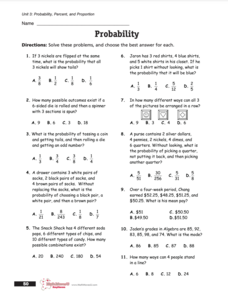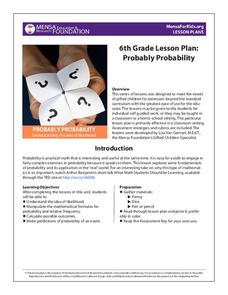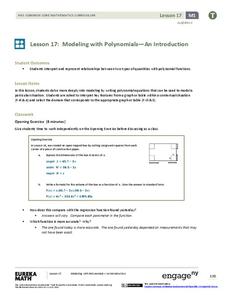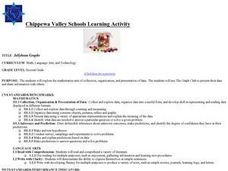Raytheon
Probability, Percent, and Proportion
In this probability and predictions learning exercise, middle schoolers read 1 page of facts, then solve 8 pages of problems related to probability, with answers keys included.
Curated OER
The Game of Chance
Third graders use manipulatives to determine the probability of outcomes. In this probability lesson, 3rd graders roll dice and use spinners to determine the probability of outcomes. They determine if games are fair/unfair based on their...
Curated OER
Story Predictions Chart
In this predictions worksheet, students complete the graphic organizer for a story that helps them predict the outcome of the story.
Houghton Mifflin Harcourt
Three Skeleton Key
Encourage your learners to interact with the text as they read. While reading "Three Skeleton Key," class members note predictions, define words and study their meanings, take notes on how the suspense builds, and jot down ideas about...
MENSA Education & Research Foundation
Probably Probability
Reinforce the concept of probability with a series of lessons highlighting the idea of likelihood, probability formulas, relative frequency, outcomes, and event predictions. The collection is made up of four lessons offering informative...
EngageNY
Using Linear Models in a Data Context
Practice using linear models to answer a question of interest. The 12th installment of a 16-part module combines many of the skills from previous lessons. It has scholars draw scatter plots and trend lines, develop linear models, and...
US Department of Agriculture
Sink or Float?
Will it sink or will it float? Learners predict the outcome as they drop random objects into a container of water. Then, they keep track of the results and record the data in a t-chart to draw a final conclusion.
EngageNY
Informally Fitting a Line
Discover how trend lines can be useful in understanding relationships between variables with a lesson that covers how to informally fit a trend line to model a relationship given in a scatter plot. Scholars use the trend line to make...
EngageNY
Normal Distributions (part 2)
From z-scores to probability. Learners put together the concepts from the previous lessons to determine the probability of a given range of outcomes. They make predictions and interpret them in the context of the problem.
EngageNY
Modeling with Polynomials—An Introduction (part 2)
Linear, quadratic, and now cubic functions can model real-life patterns. High schoolers create cubic regression equations to model different scenarios. They then use the regression equations to make predictions.
EngageNY
Calculating Conditional Probabilities and Evaluating Independence Using Two-Way Tables (part 2)
Without data, all you are is another person with an opinion. Show learners the power of statistics and probability in making conclusions and predictions. Using two-way frequency tables, learners determine independence by analyzing...
Curated OER
Probability
Ninth graders engage in a lesson that is about the concept of probability using the context of recording data and predicting outcomes. They collect marbles while recording data and graphing it. The graph is analyzed and ideas are...
EngageNY
Interpreting Residuals from a Line
What does an animal's gestation period have to do with its longevity? Use residuals to determine the prediction errors based upon a least-square regression line. This second lesson on residuals shows how to use residuals to create a...
Office of the New Jersey State Climatologist
Play Ball! – Or Not…Making a Decision Using Weather Data
Should the game go on or not? An engaging lesson asks small groups to make a decision using weather data. After analyzing a map, an updated forecast, and radar information, groups have to decide whether to cancel a baseball game. They...
Curated OER
School-Home Links/Book Links: Predictions
For this making predictions worksheet, students learn how to make predictions when reading. Students study the book cover, pages, and predict the story's outcome. Students make another prediction halfway through and then assess their...
Curated OER
Repeated Text
Students examine repeated text to predict the outcome of a story. In this language arts lesson, students read a story and use the repeated language to make predictions about what will happen next in the story.
Curated OER
That's Predictable - Stream Side Science
Research the impact that changes in biotic or abiotic factors might have on an ecosystem. Debate for or against the changes and take action in the community. This resource ideally follows stream studies that young ecologists may have...
EngageNY
Comparing Estimated Probabilities to Probabilities Predicted by a Model
Small groups devise a plan to find the bag that contains the larger percentage of blue chips. they then institute their plans and compare results to the actual quantities in the bags.
Curated OER
Jellybean Graphs
Second graders predict and graph data based on the color of jelly beans they think are in a handful. In this prediction lesson plan, 2nd graders will predict how many of each color jellybean are in a handful. Then they graph these...
Curated OER
Things Aren't Always What They Seem
Students use video and the Internet to make predictions, draw conclusions, determine conflict and point of view while reading a short story. In this short story analysis lesson plan, students watch a related video and complete a...
Curated OER
Heart to Heart
Students predict the outcome of a question and conduct a survey and record their findings on a bar graph.
Curated OER
The Tell - Tale Heart
Students read The Tell Tale Heart and practice critical analysis while reflecting on its underlying meanings. In this reading lesson plan, students make predictions, monitor their own comprehension and adjust their reading accordingly....
Curated OER
Picnic Possibilities
Fourth graders plan a picnic using weather data. Using accumulated weather data from various sources, they create a graph of the weather conditions in their region for a given period of time. Students interpret this data to predict the...
Curated OER
Probability
Students explore probability. In this probability lesson, students define theoretical probability and experimental probability. Students predict outcomes of hands on activities using coins and colored tiles, complete a chart...
Other popular searches
- Reading Predicting Outcomes
- Predicting Outcomes Math
- Predicting Outcomes in Reading
- Ged Predicting Outcomes
- Outcomes Predicting
- Predicting Outcomes in Stories

























